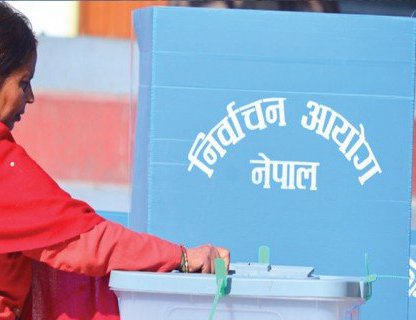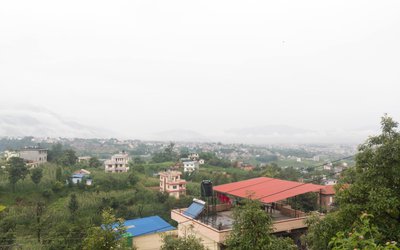
Background and the Context
Political parties are bickering over their interests (not of people and nation) and chanting mantras of transformative democracy but have abandoned fundamental responsibility entrusted on them by the electorates. Political transformation yet to show serious determination on curbing rising corruption, instability, and inability to reduce economic inequality.
Parties have increasingly become power-centric with blind fixation of empowering themselves with more state powers. At the same time, parties are fully enjoying the taste of good-feel factor, while being at the helm of political seat, and have not demonstrated serious determination on nation’s common prosperity. Lackluster conduct is pushing nation’s nascent democracy and republicanism into delirium. This is not a good example of successful experimentation of democracy and republicanism, as it now looks more like a system of ‘party-of-crazy’ and ‘rip-the-public.’ Is this what we want?
Political elites’ obsession for more power, authority, control, and influence are showing in mal functioning of governance system. Result: Increased corruption, political instability, insecurity, and economic vulnerability.Political maneuverings have revealed unpalatable aberrations as a direct outcome of fault lines in electoral process. This is evidenced by pre-election party alliance with single mantra of “political power” fixation, as being the only raison-de-etre of existence. This alliance is not based on convergence of fundamental shifts in political philosophies and party ideologies but due to obsession of seat of power.
Fault lines
Our electoral system has become a lucrative business enterprise. This is a serious bottleneck in concluding free and fair election process which is beyond the reach of average person. Political manipulation and influence have equally fractured all three branches of the governance (legislative, executive and judiciary) which was to safeguard the tenets of democracy through built-in checks and balances. Instead, institutions are riddled with partisan politicization, money,patronage, and party influence. It has phenomenal effect on unfettered corruptions and concentration of political power in few hands and influence of money.
Running for a political office is out of reach of average person as most individuals lack muscle power of money. This issue is pointed out by the two former Chief Election Commissioners of NepalMr. Neel Kantha Uprety (while speaking of “Chunauma Kasta Kamharu Garincha” on “Tamasoma Jotirmaya” on a TV broadcast1), and Mr. Bhojraj Pokharel (in policy paper “Rajnitik Bitta Byabasthapan: Nirwaachan Sudhaarko Abshar”2).
These anomalies can be fixed by adopting Mixed-Member Proportional (MMP) system, which is practiced also in Germany, New Zealand, Bolivia and Hungry, for example. Protecting liberal democracy from probable demise will require electoral changes and legislative action on some broad key areas.
I. Corruption in election must be stopped with strong legislation and electoral reform. The primary objective is to disconnect the umbilical cord between political party and money. Fixing this anomaly will require out-of-the-box rethinking without political party biases. But who will carry forward this? This is a dilemma.
II. Experience demonstrates that legislators are not inclined to carry forward required changes for reform, no matter what, for they are unlikely to legislate any curbs on their activities and compromise over power as they are enjoying the feel-good factor of being in a position on a money-making highway. This is a disincentive for change.
III. Change must first start with electoral system if we are to preserve functioning of liberal democratic system. There are variations in practices in other countries which are worth analyzing and contextualizing to our relevance, effectiveness, and adaptability. Call it a practical one and realistic – not necessarily idealist.
IV. Challenges facing political economy of Nepal are plentiful. Unfortunately, there is little or no objective public policy-making process through reviews, field research and objective analysis. This is a systemic failure because “I know it all” syndrome runs through our veins once in a position of power and authority. This is one of the products of patronage system of our socio-cultural norm.
Think-Again Pointers
Some noteworthy shortcomings of the First Past the Post (FPTP) system are (i) it excludes minority party’s fair participation, including of women, (ii) it enhances larger party dominance, (iii) it can be manipulated by changing the electoral geographical boundary, (iv) the winner is chosen by a simple majority in a single-member electoral district, thereby leaving other candidates who might have more combined votesput together - which are wasted.
A. Votersfreedom of right of choices and fair participation
1) First Past the Post (FPTP) is a “winner-takes-all.” This system does not elect candidate who might be the true representative of the constituency, among multiple candidates, because winner is elected by a single vote majority over all other candidates who may have more combined votes than the winner.It is not representational. However, Mixed-Member Proportional (MMP)voting provides a fair geographical representation, and closed constituency of single-member plurality voting deliver improved inclusion and diversity.
2) FPTP should be altered to include combined FPTP and Proportional Representative (PR) systems of voting by (i) 50% from open list of party, and (ii) 50% from the independent list of candidates. This mixed-member proportion lists from party and independent candidates can be adopted at all levels. This is more representational. Registered voters will have more freedom of choices over the list of candidates. Concurrently, it will limit undesirable influence of party.
3) Voter’s rights of voting are compromised under the Proportional (PR) Representation system in Nepal because it lacks absolute rights to choose, transparency, and vote for candidates in equal proportionality. Party chooses proportional representation of closed party list of candidates. This is discriminatory and contributes to a situation whereby family members of influential political clan get selected, and head of party could dictate over the choice. This is undemocratic and promotes repositioning of influential family clan in building a political dynasty, and party autocracy.
4) Changes in the current Proportional Representation with open list of mixedcandidates should be considered. This will provide smaller parties and independents to submit list of candidates to the election commission and allows voters to elect anyone from the broad list of mixed candidates, as mentioned in preceding point (1) above. This system will contribute to a reasonable balance in securing party representatives and creating electoral opportunities for smaller ones. The current practice in Nepal does not allow voters to express their preferences among the list of all candidates because party dictates closed party list. Open listgives more freedom of choice to the voters and limits party’s control over its candidates. Several countries in Europe use open list in PR.
5) Intra-party functioning will require changes. Current practice undermines free selection of candidate without voting within party and its members. Candidate is chosen by party head without votes by party members and/or constituency.
6) Candidates should not be allowed to contest multi-seat for it deprives other eligible candidate’s ability to contest in election amid overwhelming influence of larger parties.
7) No one should be permitted to contest in election for a public office and occupy position once he/she is accused of any criminal offence in the court of law and until he/she proves otherwise.
8) Voters should have legal right to ‘Recall Vote.’ At least twenty-five percent of registered voters of constituency can demand for ‘recall’ of the elected member. If this occurs, elected member should be suspended immediately and face charges in a court of law. Recall should be considered based on evidence of abuse of power of office, embezzlement, misuse of public funds, graft, conflict of interest, nepotism, or unsatisfactory performance as per election manifesto. Recall-vote should be held forthwith and if convicted such individual should be barred from holding government and political office for the next twenty-years or imprisoned for ten years without bail.
9) Election Commission should designate polling places/locations of voting centers by preferential treatment to senior citizens, pregnant voters, and persons with disabilities
10) Voters should be entrusted with a voting right of ‘No Vote’option if voter does not wish to vote anyone listed on the ballot paper.
B. Accountability, integrity, and transparency
1) No financial contribution for the purpose of partisan political activity should be allowed from public institution, individual or private financial institution, official or government employee, foreigner, and foreign corporation.
2) Campaign contributions should be depositedinto party account. Election campaign expenses should be out of the party budget.All incomes and expenditures should be recorded in books of account and audited by an independent auditor within two weeks of the last day when voting ends. Failing to comply this party should be suspended on charges of financial misconduct.
3) Campaign funds account should be published in print and electronic media for public information within thirty days after the last day when voting concludes. Failure to comply with this provision party will face criminal charges and party leadership will be suspended on account of fiscal management irregularity and face legal prosecution.
4) Election Commission will set expenditure limit based on total number of registered voters for constituency. No candidate, individual or party-member, will spend an aggregate amount exceeding NRs15 (fifteen) for every voter currently registered in the constituency where a candidate fileshis/her candidacy.No one will be allowed to raise separate campaign fund and more than the upper limit set by the Election Commission.
5) Government authority and resources should not be used in electioneering. No private individual, member of government, and member of political party is entitled to mobilize and/or use government funded services, media, personnel, including resources of para-statal institutions, for election campaign purposes. If anyone found to be in violation of this provision will be automatically disqualified from the election, and criminal prosecution should be filed in a court of law.If charged by the court of law responsible person will face ten-years of prison, and no bail allowed.
6) Anyone running for any election should mandatorily file a ‘Statement of Liabilities, Assets and Earnings’ with Tax Department prior to filing application with Election Commissioner’s Office for candidacy. No one should be permitted to hold political seat and government office without complying with this legal disclosure requirement.
7) Elected member must re-submit a ‘Statement of Liabilities, Assets and Earnings’ with Tax Department thirty days prior to leaving the office tenure. Failing to comply with this requirement should result in lifetime ban on participation in future elections and holding political and government office.
8) Any individual and/or political party member found to be in violation of mandatory discloser of financial report should be automatically disqualified from parliamentary seat/position and permanently barred from holding political, diplomatic and government office and face criminal charges immediately.
9) Parliamentarian, when out of office term, should not receive special status, like VVIP, VIP treatments, free housing, security, benefits and other facilities, and other state supports that are not at par with what is accorded by law to an average person of the Federal Democratic Republic of Nepal.
10) Legislator's responsibility should be limited to enacting legislation only. However, the lawmakers should also monitor implementation of the legislation they enact.
11) Members of the houses of parliament should not be permitted to assume executive role (i.e., ministerial position) and any other government and/or business corporate position. This will dis-incentivize raising campaign fund for election and then discourage politics as money-making platform as well as pathways in building politics as a permanent professional career. Public service is a selfless duty of service to the nation.
12) Allow party leader, with majority in the parliament, to setup an executive branch of government with a fixed number of council of ministers of choosing any one from merit-based party loyalist and non-party individual with technical knowledge of subject-matter expertise on merits and proven competencies, for example. There should be no exception to this provision.
13) Parliamentarian must equally abide by all laws imposed on Nepali citizen by them without any exception. Principle enshrined: No one is above the law, irrespective of public office and/or social group status, position, and wealth.
14) Parliamentarian and members of their family should not receive benefits, allowances, and financial entitlements, including pension, when not serving for public office. Principle enshrined: ‘no office tenure, no work, and no remuneration’ from public treasury.
15) If a parliamentarian is found to be implicated, while being in elected or nominated office, in a court of law for civil and/or criminal act or social, misdemeanors, nepotism, benefits receiving from private individual and/or business for political favor, he/she should be automatically suspended from the office, and not permitted to participate in parliamentary proceedings. If convicted such individual should not be allowed to hold public office thereafter for fifteen years or serve eight years in prison, and bail.
16) Parliamentarian should not be allowed to vote themselves for their salary, pension, benefits, and other personal favors other than what is accorded to a common person. Living allowances, however, may by adjusted only after cost-of-living survey index and analysis by independent experts.
Last word
Above list is not exhaustive but just a few pointers to provoke food-for-thought. One can also think of parallel reform in judiciary which has lost its judicious impartiality as demonstrated by the controversies surrounding prosecutions of the Chief-Justices of Supreme Court and subservient bureaucracy. Bothare seen in collusion with political party elites. However, we all know changes will require relevant legislations, and politicians love to do nothing for they just want to stick to power and influence. I wonder, who in Nepal's legislative and executive body will take the trouble of doing this act of hara-kiri?
Right now, political elites are pre-occupied in their obsession for a political seat and, as such, frantically looking for pre-election maneuverings and financing interests, among others. The reality is that the one who gets elected will understandably not focus on anything else but recouping investment made during the election process.
In short, democracy is corrupted by money. Therefore, democratic functioning of state mechanisms and institutions are issues for deeper conversations and public engagement for pragmatic and adaptable way forward. This will require a visionary outlook and public awareness.

Kedar Neupane
He can be reached at Neupanek1950@gmail.com
- Talking About South Asian Diaspora Community And Its Economic Prowess In The USA
- Aug 23, 2023
- Talking About Growth Miracle And Emerging Quadripolar Economic Construct (Part – Two)
- Jul 28, 2023
- Talking About Growth Miracle and Emerging Quadripolar Economic Construct (Part – One)
- Jul 02, 2023
- Pseudo-Nationalism Is About Political Desperation And Sure Sign of Economic Collapse Context And Background
- Jun 19, 2023
- Realities In Conflict Of Interest And Challenges Of Combating Corruption In Nepal: PART -TWO
- Jun 08, 2023
















